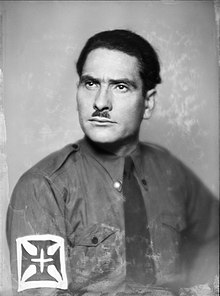Francisco Rolão Preto
Francisco Rolão Preto | |
|---|---|
 Francisco Rolão Preto | |
| Leader of the National Syndicalist Movement | |
| In office 15 February 1932 – 29 July 1934 | |
| Preceded by | Office established |
| Succeeded by | Office abolished |
| Personal details | |
| Born | 12 February 1893 Lisbon, Portugal |
| Political party | National Syndicalists (1932–1934) People's Monarchist Party (1974–1977) |
| Spouse | Amália Boavida Godinho |
| Children | 2 |
| Alma mater | University of Toulouse |
Francisco de Barcelos Rolão Preto,
After the Revolution of April 25, with Gonçalo Ribeiro Telles, Henrique Barrilaro Ruas, João Camossa de Saldanha, Augusto Ferreira do Amaral, Luís Coimbra, among others, he founded the People's Monarchist Party.
In 1994, the Portuguese President Mário Soares granted him, posthumously, the Great Cross of the Order of Prince Henry the Navigator.[5]
The national syndicalists
The national syndicalists, also called the "Blue Shirts" (camisas azuis), following the tradition of uniformed
He advocated especially the personalism of Emmanuel Mounier and some of the aspects of unionism. His unionist platform was based on leftist ideas of social justice, such as "a minimum family wage", "paid holidays", "working class education", and a world in which workers are "guaranteed the right to happiness".
Early life
Cutting short his
Rolão Preto had to flee Belgium when
Against Salazar's regime
In 1930, he approached
The Preto personality cult grew in 1933 as the movement took to the streets and Preto engaged himself in a national propaganda tour. Preto became a regular presence at Italian Embassy receptions.
After a long meeting with the chief of the political police, Salazar decided to dissolve the National Syndicalist Movement. On 4 July 1934 Preto was briefly detained and later exiled as part of purge of the leadership of the National Syndicalist Movement. Salazar denounced the National Syndicalists as "inspired by certain foreign models" and their "exaltation of youth, and the cult of force through direct action, the principle of the superiority of state political power in social life, [and] the propensity for organizing masses behind a single leader" as fundamental differences between fascism and the Catholic corporatism of the New State.[10] The British Embassy informed London with some satisfaction stating that the Portuguese National Syndicalist Movement took "its inspiration from the Italian Embassy" and described Preto as a "vain man with a strong sense of intrigue".[10]
Preto ended up opposing the Salazar's regime for being too moderate and due to Salazar's refusal to turn the emerging corporative state into a truly fascist regime.[11] Preto resided, for a while, in Valencia de Alcántara, near the border with Castelo de Vide, and then in Madrid, as a guest in the house of José Antonio Primo de Rivera, with whom he collaborated in formulating a program for the Falange.
Preto returned to Portugal in February 1935, and was once more detained after instigating a September rebellion with the crew of the Bartolomeu Dias and the garrison in the Lisbon-area Penha de França. Again exiled, he fought in the Spanish Civil War on Francisco Franco's side.
Preto returned, once more, to Portugal in the eve of the Second World War and published new editions of his work on Italian Fascism originally written in 1922. Preto placed high hopes on the Berlin-Rome axis, and in his introduction to Fascism (O Fascismo), he attacked the Salazar regime and exalted Italian and German Fascism.[2] With the rise of Nazism in Germany and Fascism in Italy, Rolao Preto was optimistic about the future of European fascism, he pinned all of his hopes on an Axis victory, and confronted those who were not "real fascists" but wished to adopt aspects of fascism.[3]
After
In 1949 participated in
Later years
After the fall of the Estado Novo regime Preto attempted to unite the monarchist movement behind Gonçalo Ribeiro Telles's Movimento Popular Monárquico. Preto was one of the leaders of the Movimento (People's Monarchist Party) in the period between the Carnation Revolution (1974) and his death (1977).
In 1994, the Portuguese President Mário Soares granted him, posthumously, the Great Cross of the Order of Prince Henry the Navigator.[12]
Marriage and children
He married Amália de Brito Boavida Godinho (b. Fundão, Alpedrinha), and had two children:
- Francisco Godinho Rolão Preto (b. Fundão, Soalheira), married to Maria Isabel Correia da Silva Mendes; and
- Maria Teresa Godinho Rolão Preto (b. Fundão, Soalheira), married to Eduardo Teixeira Gomes.
Sources
- ISBN 088033-9829.
- S. U. Larsen, B. Hagtvet & J. P. Myklebust, Who Were the Fascists: Social Roots of European Fascism, Oslo, 1980
- ISBN 9780299148737.
rolao preto.
References
- ^ Probably the day of his christening.
- ^ a b Costa Pinto 2000, p. 15.
- ^ a b c d Costa Pinto 2000, p. 16.
- ^ a b c d e Costa Pinto 2000, p. 223.
- ^ ."Francisco Rolão Preto". Presidency of the Portuguese Republic. Retrieved 30 April 2015.
- ^ Preto, R., ‘Crónica social’, Nação Portuguesa, 2ª série, Nº 1, July 1922, p. 34.
- ^ José Hipólito Raposo, Dois Nacionalismos - L'Action française e o Integralismo Lusitano, Lisboa, Férin, 1929.
- ^ a b Costa Pinto 2000, p. 229.
- ^ Costa Pinto 2000, p. 173.
- ^ a b c Costa Pinto 2000, p. 112.
- ISBN 978-1929631902.
- ^ ."Francisco Rolão Preto". Presidency of the Portuguese Republic. Retrieved 30 April 2015.
